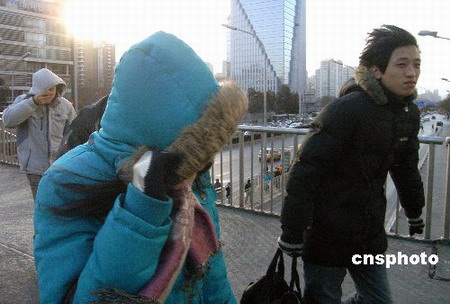BEIJING -- The first major snowfall brought by the coldest temperatures so far this year disrupted the plans of thousands of travelers in north China on Thursday.
|

Passengers, braving chilling cold, walk on an overpass in the capital city of Beijing Thursday, January 22, 2009. The first major snowfall brought by the coldest temperatures so far this year disrupted the plans of thousands of travelers in north China on Thursday. [cnsphoto]
|
Eight expressways were closed and another six was closed to traffic in the northeastern Liaoning Province after heavy snow began falling Wednesday night, said a provincial government spokesman.
The Taoxian International Airport in Shenyang, the provincial capital, closed for at least five hours on Thursday morning. Flights resumed at 11 a.m. after staff finished clearing the snow on the runway.
However, almost 1,000 passengers were still stranded at 3 p.m. and over 30 flights delayed.
Hundreds of passengers were stranded in Dandong Airport as five flights were delayed due to the snow in the morning. The staff were still cleaning the snow at 5 p.m.
Flights to the cities of Shanghai, Shenzhen, Sanya, Chengdu and Beijing were all delayed.
Airports Dalian and Jinzhou, in southern Liaoning, were not affected, but airport officials were preparing for bad weather. Slight snow was forecast Thursday night in Dalian.
"Many passengers asked us whether flights to Shanghai will take off as scheduled tomorrow. We are just not sure," said an information officer at Jinzhou Airport.
The cold wave has lowered temperatures by 8 to 10 degrees Celsius in China's most northern province of Heilongjiang. They plunged to minus 27 Celsius degrees in Harbin, the provincial capital, according to Heilongjiang Meteorological Station.
The freezing temperatures are forecast to move south across much of China, and the Central Meteorological Station (CMS) Wednesday issued an orange cold wave alert, the second most critical level after red.
The orange alert takes effect when temperatures are expected to drop by 12 degrees Celsius within 24 hours to below zero. It requires local governments prepare for potential emergencies, including failures in heating and water supplies or traffic blocks, according to the CMS.
It also warns farmers to take precautions to prevent crop and stock losses.
"The cold wave is expected to last until Saturday, but low temperatures could linger in south China next week," said CMS chief meteorologist Zong Zhiping.

